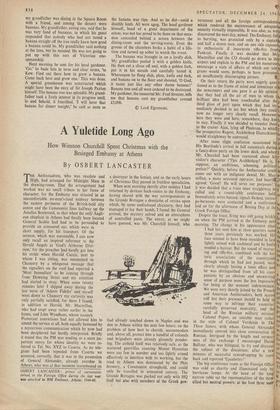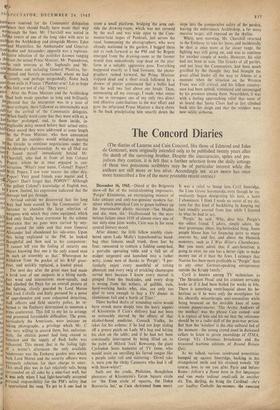A Yuletide Long Ago
How Winston Churchill Spent Christmas with the Besieged Embassy at Athens By OSBERT LANCASTER
OSBERT LANCASTER : prince of cartoonists: served in the Foreign Office during the last war: was attached to HM Embassy, Athens, 1944-46.
a destroyer in the Ionian, and so the early hours of Christmas Day passed in fruitless speculation.
When next morning shortly after midday I had returned by devious back-routes to the Embassy, having shared with the war correspondents at the Grande Bretagne a demijohn of retsina upon which, by some undisclosed chicanery, they had managed to lay their hands, I found the General arrived, the mystery solved and an atmosphere of controlled panic. The envoy, as we might have guessed, was Mr. Churchill himself, who
had already touched down in Naples and was due in Athens within the next few hours; on the problem of how best to cherish, accommodate and, above all, protect him a handful of colonels and brigadiers were already gloomily ponder- ing. The airfield itself was relatively safe, as the scattered guerrillas roaming Mount Hymettus were too few in number and too lightly armed effectively to interfere with its working, but the road to Athens was dominated by the Phix brewery, a Communist stronghold, and could only be travelled in armoured convoy. The Grande Bretagne was packed not only with HQ Staff but also with members of the Greek gov-
vernment and all the foreign corresponden which rendered the maintenance of adequa security virtually impossible. It was also, as wa discovered the next day, mined. The Embassy, fu to bursting, was protected only by a capta and half a dozen men, and on one side expose to enthusiastic if inaccurate rifle-fire fro Pankrati. Finally it was decided that M Macmillan and the CO should go down to th airport and explain to the PM and his numerou entourage a state of affairs of which our tel grams would seem, perhaps, to have present an insufficiently discouraging picture.
On their return the party were eagerly ques honed as to the frame of mind and intentions o the newcomers and one gave it as his opinio that they had all the air of men to whom brilliant idea had been vouchsafed after th third glass of port upon which they had im mediately decided to act but which they coul now no longer very clearly recall. However here they were and here, somewhere, they ha to stay. Finally it was decided to transfer then to the cruiser Ajax, lying off Phaleron, to whic the prospective Regent, Archbishop Damaskinos would straightway be conveyed.
After some slight confusion occasioned b His Beatitude's arrival in full canonicals durin a fancy-dress party on the lower deck, and whe Mr. Churchill had been reassured about hi visitor's character (This Archbishop? He is, suppose, an ambitious, scheming, politica prelate?' Quickly, before the Ambassador coul come out with an indignant denial, Mr. Mac millan, a more seasoned operator, had hearti agreed. 'Good! He will serve our purposes!') it was decided that a truce must straightway b called and a round-table conference held Immediately wires buzzed, signals flashed, siniste go-betweens were contacted and a conferenc laid on for the afternoon of Boxing Day at th Greek Foreign Office.
Despite the truce, firing was still going briskl on when the PM arrived at the Embassy nex morning. The change in his appearance sine I had last seen him at close quarters som
three years previously was marked. Hi face seemed to have been moulded in lar lightly veined with cochineal and he badl needed a haircut. But the sound of mortar ing and rifle-fire, combined with the his tonic associations of the countrysid through which he had just passed, were clearly already having a tonic effect and he was distinguished from all his corn, panions by an obvious and unswerving sense of purpose none the less impressive for being at the moment indeterminate. We were very shortly joined by the French and American Ambassadors, both scared stiff lest their presence should be held in some way to infringe their countries' carefully preserved neutrality, and the head of the Russian military mission, Colonel Popov, an amiable man rather in the style of Colonel Vershinin in The Three Sisters, with whom General Alexander immediately entered into close conversation in Russian. Intrigued by the length and earnest, ness of this exchange I encouraged David Balfour, who was bilingual, to try and discover the subject of the discussion; after a fee/ minutes of successful eavesdropping he came back and reported 'Epaulettes!'
The big conference room at the Foreign -Office was cold as charity and illuminated only by hurricane lamps. At the head of the long narrow table sat the representatives of the three allied but neutral powers; at the foot three seats were reserved for the Communist delegation When they should finally have made their way through the lines. Mr. Churchill was seated in the centre of one of the long sides with next to him the Archbishop and alongside Messrs. Eden nd Macmillan, the Ambassador and Generals Scobie and Alexander; opposite was a represen- Mr tative selection of the politikos kosmos ranging from the actual Prime Minister, Mr. Papandreou, to such veterans as Mr. Sophoulis and Mr. Maximos and including General Plastiras, fur- Vated and fiercely moustached, whom we had ccently, and perhaps misguidedly, flown back from exile in France. ('Plashter-arse? Let us hope his feet are not of clay.' They were.) After the Prime Minister and the Archbishop had both made speeches so long and brilliantly phrased that the interpreter was in a state of near-collapse, there followed an interminable wait for the arrival of the Communist delegates. When finally word came that they were with us, a further prolonged, and, to those inside, in- explicable delay ensued before their actual entry. Once seated they were addressed at some length by the Prime Minister, who then announced that all the outsiders would withdraw leaving the Greeks to continue negotiations under the Archbishop's chairmanship. As we all filed out I found myself immediately behind Mr. Churchill, who had in front of him Colonel Popov, whom he at once engaged in con- versation. 'What's your name, Colonel? Popov? Well, Popov, I saw your master the other day, Popov! Very good friends your master and I, l'opov! Don't forget that, POPOV!' Although the gallant Colonel's knowledge of English was, I knew, limited, his expression indicated that the message had got through.
Arrived outside we discovered that the long Wait had been caused by the Communists' re- luctance to abandon the large selection of Weapons with which they came equipped, which had only finally been overcome by the solemn assurance that no guns were carried by any- one around the table and that even General Alexander had abandoned his side-arms. Upon this being explained to the PM, he looked thoughtful and then said to his companion: `I cannot tell you the feeling of security one enjoys knowing that one is the only armed man in such an assembly as that.' Whereupon he Withdrew from the pocket of his RAF great- coat, and quickly replaced, a loaded pistol.
The next day after the great man had made a brisk tour of our outposts in a biting north- fast wind and intermittent snow-squalls, and had climbed the Pnyx for an overall picture of Nthe fighting, closely guarded by Lord Moran and Jock Colville and hotly pursued by a posse of apprehensive and soon exhausted detectives, staff. officers and field security police, he re- turned to the Embassy determined to summon a press conference. This fell to my lot to arrange and presented formidable difficulties. The press, Particularly the Americans, were insistent on taking photographs, a privilege which Mr. C Was very willing to accord them, but, unfortun- ately, the electric powet had long ceased to function and the supply of flash bulbs was exhausted. This meant that in the failing light of a winter's afternoon the only available rendezvous was the Embassy garden into which both Lord Moran and the security officers were extremely reluctant for their charge to enter. This small plot was in fact relatively safe, being surrounded on all sides by a nine-foot wall, but it was only when I had light-heartedly accepted is . personal responsibility for the PM's safety that
I appreciated the snag. To get to it one had to
cross a small platform, bridging the area out- side the drawing-room, which was not covered•by the wall and was wide open to the Com-
munist-held slopes of Pankrati, just across the road. Summoning the photographers, who were already stationed in the garden, 1 begged them not to rush forward as the PM and the Regent emerged from the drawing-room as the former would then undoubtedly stop dead on the plat- form in a suitably aggressive pose. Everything happened exactly as I had foreseen; the photo- graphers rushed forward, the Prime Minister stopped dead and a short crack followed by a shower of plaster announced that a bullet had hit the wall two feet above our heads. Then, summoning all my courage, I made what seems to me in retrospect one of my only two direct and effective contributions to the war effort and gave the infuriated Prime Minister a sharp shove in the back precipitating him smartly down the steps into the comparative safety of the garden, leaving the unfortunate Archbishop, a far more massive target, still exposed on the skyline.
When, next morning, Mr. Churchill returned to the Embassy to take his leave, and incidentally be shot at once more at far closer range, the fighting was still going on, and was to continue for another couple of weeks. However, his visit had not been in vain. The Greeks of all parties, and not least the Communists, had been much gratified by the thought they had brought the great . allied leader all the way to Athens at a moment when the situation on the Western Front was still critical, and his fellow country- men had been upheld, stimulated and encouraged by his presence among them. Neverthless, it was with a feeling approaching relief that some of us heard that Santa Claus had at last climbed back into his sleigh and that the reindeer were now safely airborne.































 Previous page
Previous page